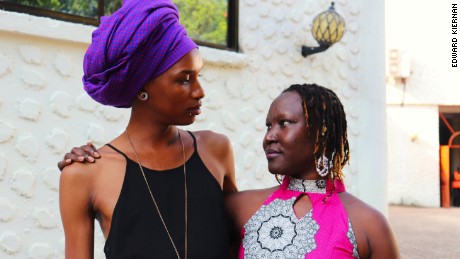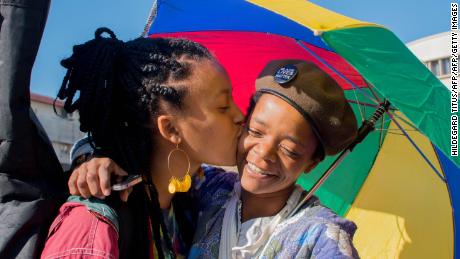‘Rafiki’ will premiere at Cannes

Kenya's Film and Classification Board (KFCB) said Thursday "Rafiki" was banned because of intent to "promote lesbianism," in the country."The film has been restricted due to its homosexual theme and clear intent to promote lesbianism in Kenya contrary to the law," a statement from the board said. It added that the film should not be distributed or shown anywhere in the country and anyone found with a copy would be in breach of the law.Kenyan filmmaker Wanuri Kahiu, who directed the movie, took to Twitter to express her disappointment, saying,"We believe adult Kenyans are mature and discerning enough to watch local content but their right has been denied.""Rafiki" an LGBT-themed movie makes history as the first Kenyan movie to premiere at Cannes, with its debut appearance next month.Inspired by the 2007 Caine Prize winning short story "Jambula Tree" by Ugandan writer Monica Arac Nyeko, "Rafiki" which means 'friend' in Swahili is the story of friendship and tender love that grows between two young women amidst family and political pressures.
Homosexuality in Kenya
Kenya is highly conservative and a large majority holds negative views about LGBT people.Kenya's penal code criminalizes "carnal knowledge against the order of nature." Anyone found engaging in homosexual activities could face up to 14 years in prison. Prompted by public uproar, the police arrested two men in 2015 and conducted forced anal examinations on them to prove they were engaging in homosexual conduct.
Prompted by public uproar, the police arrested two men in 2015 and conducted forced anal examinations on them to prove they were engaging in homosexual conduct. Afterwards, anal examination was ruled constitutional by Kenyan courts as evidence in trials of men accused of homosexuality.Kenya's progressive new constitution promulgated in 2010 guarantees all Kenyans the rights to privacy, equality, dignity and non-discrimination; yet LGBT people in Kenya face discrimination and violence, according to the Human Rights Watch.Two months ago, Kenya's High Court began hearing a case that may decriminalize homosexuality in Kenya.
Afterwards, anal examination was ruled constitutional by Kenyan courts as evidence in trials of men accused of homosexuality.Kenya's progressive new constitution promulgated in 2010 guarantees all Kenyans the rights to privacy, equality, dignity and non-discrimination; yet LGBT people in Kenya face discrimination and violence, according to the Human Rights Watch.Two months ago, Kenya's High Court began hearing a case that may decriminalize homosexuality in Kenya.
Why was "Rafiki" banned?
The board said "Rafiki" was banned because it had homosexual scenes and undertones which were not in the script originally submitted for approval. It had called the director when the movie was finally submitted and asked for some homosexual scenes to be removed, however the director refused. The KFCB said in the statement that foreign sponsors who intend to introduce and normalize homosexuality in Kenya through movies should desist from such acts."Kenya is a country with a culture, beliefs and shared values which must be respected," it said."Hare-brained schemes by foreigners funding film producers in Kenya to promote homosexuality in the name of equality and inclusion will be exposed and strongly resisted."
Controversy on social media
Follow @CNNAfricaThe ban has sparked quite a number of reactions on social media. The film's supporters lashed out at the film board for "restricting" the movie."This idea of 'we do this for the children' has been used all across history to yank away rights from people. What happened to freedom of expression?" Brian Kelwon said on Twitter.But some Kenyans have expressed support for the ban, saying the film board did the right thing to preserve the culture and traditional values of the country."If the movie's content will promote and encourage our youth into homosexuality then it should be banned," said Kennedy Onkoba.KFCB has banned some movies in the past.In 2014, it banned the Oscar-winning "Wolf of Wall Street" for extreme scenes of nudity, sex, alcohol, drug-taking and profanity.It also forced Coca-Cola to scrap a kissing scene in an ad because it "violated family values."
Original Article
[contf] [contfnew] 
CNN
[contfnewc] [contfnewc]



